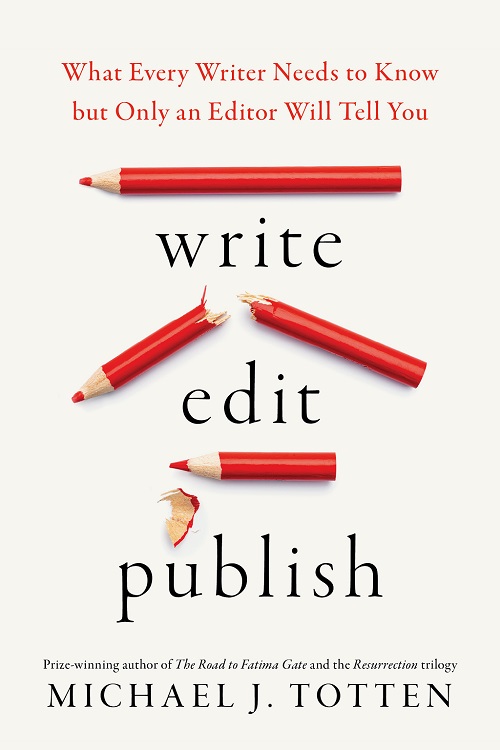I’m about to tell you one of the most important things you’ll ever learn as a writer: Agents, acquisitions editors, and magazine editors can determine (with greater than 90 percent accuracy) if a manuscript was written by a seasoned professional, a semiprofessional, or an amateur after reading as little as the first sentence and at most the first paragraph. The vast majority of manuscripts are rejected before the agent or editor gets to the bottom of the first page.
It ought to go without saying then that the first sentence in a book, story, article, or essay has more work to do than any other. There will be a brief moment in time when readers will have read that, and only that, sentence. They won’t be able to judge your work based on anything else. And if they’re in a hurry, if they have hundreds of submissions to wade through, or they’re scrolling the news feed on their phone, or they’re standing in a bookstore aisle, or they’re sampling the opening pages of ebooks because they don’t know what they want to read next, you need to grab them by the throat and refuse to let them go. And if you fail to do so, they’re outta there, and they’ll forget you ever existed.
Some readers are more forgiving. If you’re writing the eagerly awaited thirty-seventh installment in your beloved Buck Digler series about a lovable zombie who moves from town to town and helps local law enforcement and plays matchmaker on the side, you probably don’t need to worry as much about your first sentence or your first page. You hooked your audience thirty-six years ago.
But if readers, agents, and acquisitions editors have never heard of you, you have one sentence (and one page at the absolute most) to make an impression.
With that in mind, tell me what’s wrong with this sentence.
Bob took off his coat, sat at his desk, and booted up his computer.
I read that to my wife and asked her what she’d think if it were the first sentence in a book, and she made a face. “It’s lame.”
How about this one?
Frank sat on his couch, reached for the remote, and sighed.
Now, grammatically there’s nothing wrong with these sentences. There are no typos. They are punctuated correctly. There is no garbled syntax, no extra words bloating them up like a beached whale carcass. If one of these sentences were to appear on page 171 of your legal thriller, fine, but they’re terrible openings. Because they’re boring, because they promise no payoff if the reader summons the requisite patience and energy to proceed to the next sentence.
And they follow a formula of sorts that I see over and over again, almost 50 percent of the time, in manuscripts from writers I work with, whether I’m working as a developmental editor or as a copy editor: the first sentence begins with a character’s name followed by a verb followed by a description of something perfectly ordinary.
Here’s an even worse opening sentence:
Bob sat on the bed and yawned.
Ooh, what’s he going to do next? Set his alarm? I can’t wait to find out!
You don’t need to (and probably shouldn’t) start with a gunfight, an explosion, or a car chase, but you do need something out of the ordinary. The sky doesn’t need to turn green as the sun sets over a river of Dr Pepper, but your character needs to experience something unusual, something that disturbs his or her everyday world, some tension, some conflict, or a question. Something like this:
Brenda shuddered when old Milo Durkovich lurched into the barbershop.
That’s the opening sentence of a short story by Ray Vukcevich in his collection Meet Me in the Moon Room.
Vukcevich could have opened by having Brenda walk into the barbershop and say hi to the owner, but that would be boring, and it’s not where the story begins anyway. Worse, the first page could have described Brenda leaving some kibble for the cats, grabbing her keys, getting into her car, and driving toward the barbershop, but why? Don’t drive to your story. Start at the beginning. Not before the beginning.
Some authors rescue themselves in the second sentence, which is suboptimal, or on the second page, which is usually fatal, but some don’t rise above the mundane until several pages or even chapters in, and that’s a catastrophe.
Long ago, I heard something remarkable from the editor of a fiction magazine: a huge percentage of story submissions that landed on his desk began with a character waking up in bed. Some even narrated that character’s morning routine: face washing, teeth brushing, shampooing, breakfasting.
No one on earth wants to read that.
And those were short stories, where every last word needs to justify its existence.
Now, I have never actually seen this myself. Even beginning writers nowadays instinctively know not to do this. They might drive to the beginning of their story, but at least they start with the character in the car instead of in bed.
So I’m telling you to start at the beginning, but even that’s not good enough anymore. If you want to write a killer first sentence, you simply must begin with some kind of disturbance, tension, conflict, or question. Your sentence must compel readers to continue to the next one if they want to find out what happens next, learn more, or get the answer to whatever question you just raised. As long as you do this, nearly all readers will continue to the next sentence. It’s basic human psychology.
You do not need to do this with every sentence you write. If you open a book to a random page and pluck out a sentence, it probably won’t be compelling all by itself. Which is fine because if the author has done their job, the story should have some momentum by that point, some drama and suspense and captivating characters and story questions that readers want answered. At the beginning of the book, though, there is no momentum. It’s like the big bang that birthed the universe. Nothing (that we know of) came before. That first sentence is just hanging there in the reader’s mind all by itself, and it’s either interesting enough to grab their attention or it’s not.
Films and novels move faster now than they used to. Journalists know not to bury the lede (the most important part of a story) in the third or fourth paragraph. Maybe the internet has obliterated our attention spans and turned us into the equivalents of goldfish, chasing word pellets around in a tank and unable to remember anything that happened more than six seconds ago. Perhaps this is bad, something to be lamented. Leave that to the cultural critics. You are not going to fix this by starting your story with Marty rooting around in the fridge for some eggs. Even if we all had the attention spans of Plato and Cicero, you’d still have a competitive advantage over other authors if you managed to hook your readers in the very first sentence while everyone else was warming up with some stretches.
You don’t need to have a homicide or a carjacking in the first sentence, not even if you’re writing crime fiction. All you need is something unusual, a small disturbance of some kind. Like this:
The girl jumped out of the back of a white Chevy Express at 9:47 p.m.
That’s the opening sentence of Throwaway Jane by Scott William Carter. It’s a great opening sentence because something unusual is happening that readers will naturally want to know more about. Who’s the girl? Why’s she jumping out of a van?
You could also start with a simple story question. Consider the opening sentence in Lee Child’s Tripwire, the third book in his blockbuster Jack Reacher series:
Hook Hobie owed the whole of his life to a secret nearly thirty years old.
Boom. Story question. What’s the secret? It’s a mystery. Readers don’t learn the answer until nearly the end of the book. But boy do they want to know, not only because Lee Child planted that question in their minds in the very first sentence but because all kinds of violent and dramatic things unfold over the course of that book as a result of Hook Hobie needing to keep that secret locked down.
And consider the opening sentence of Brand New Cherry Flavor by Todd Grimson:
So the whole thing started in a restaurant.
That sentence is doing a lot of work. The casual and conversational “So” gets things started using a casual storyteller voice. You can practically hear that word coming out of the mouth of one of your friends as you’re sitting down with beers on the table or gathered around the fire pit in the backyard.
Next up: “the whole thing.” At this point, one sentence into the novel, readers have no idea what “the whole thing” is unless someone told them or they read the description on the back of the book or saw the trailer for the Netflix series based on the book. But those three words tell us there’s lots and lots of story ahead. And the final four words, “started in a restaurant,” not only establish part of the setting but also tell us that the author is starting his story at the very beginning with no long, slow, boring buildup.
That sentence, “So the whole thing started in a restaurant,” doesn’t describe a disturbance of some kind, but it implies one. Whatever happens next isn’t going to be the usual forgettable restaurant experience or lunch date that we’re all familiar with. Something big is about to happen, or at least get started, in that restaurant.
The author could have described the main character taking a seat, smiling at her dining companion, and picking up the menu, but that wouldn’t be interesting. It would be entirely and painfully ordinary. No one would feel compelled to read the next sentence.
Here are some more terrific opening sentences.
I’m pretty much fucked.
—The Martian by Andy Weir
She had to leave everything behind.
—The Disappeared by Kristine Kathryn Rusch
It was a bright cold day in April, and the clocks were striking thirteen.
—Nineteen Eighty-Four by George Orwell
It was predictable, in hindsight.
—The Sparrow by Mary Doria Russell
God erupted in thunder and shattering glass.
—What I Lived For by Joyce Carol Oates
The cell door slammed behind Rubashov.
—Darkness at Noon by Arthur Koestler
Most of the crowd at Mallory’s Bar & Sleep over in Delta Sector had no idea what was really going on.
—The Real Story by Stephen R. Donaldson
Many years later, as he faced the firing squad, Colonel Aureliano Buendía was to remember that distant afternoon when his father took him to discover ice.
—A Hundred Years of Solitude by Gabriel García Márquez
We shot dogs.
—Redeployment by Phil Klay
I hope you agree that those are all killer first sentences. And you should see that there’s no formula, no single right way to write one. They can be long or short, dramatic or mysterious, artfully written or straight to the point. What they can’t be is boring. And if you use the “formula” I see from too many beginning writers—a character name followed by a verb followed by a description of something perfectly ordinary—you’ve hobbled yourself with a boat anchor chained to your leg.
*
If you enjoyed this post, you can read so much more in my book Write, Edit, Publish: What Every Writer Needs to Know but Only an Editor Will Tell You. You can also hire me as a developmental editor, line editor, copy editor, or publishing consultant. Tell me what you’re working on, send me your questions, ask for a free sample edit, or just say hi.


